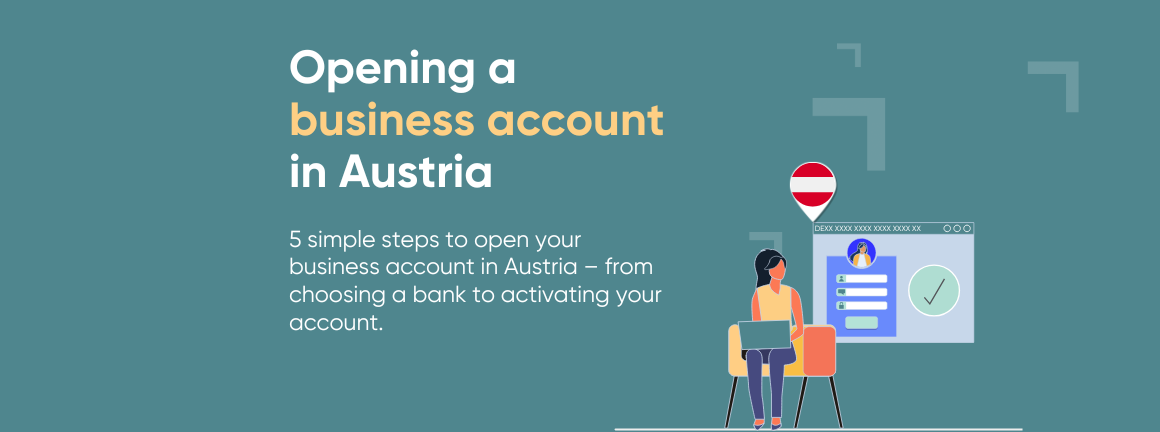The strong domestic market, access to the EU, and central location in the heart of the DACH region make Austria an attractive destination for entrepreneurs from around the world. This comprehensive guide provides all the relevant information you need to open a business account in Austria.
Benefits of a business account in Austria
A business account in Austria offers numerous advantages for entrepreneurs looking to operate in a stable and growth-oriented market. The Austrian economy is known for its stability and quality, which strengthens trust among customers and business partners. In addition, companies benefit from the high standards of the banking sector, reflected in excellent service and tailored solutions.
- Stable economy: Austria provides a solid economic environment that offers businesses security and enables long-term planning.
- Quality service: Austrian banks are renowned for their excellent customer service and tailored financial solutions for businesses.
- Trust from customers and partners: Having a business account with a reputable Austrian institution signals reliability and builds trust with international partners.
- Euro-based transactions: As a member of the European Union, Austria enables simple and cost-effective euro payments, making transactions within the EU efficient and secure.
- Access to the EU single market: Thanks to its geographical location and EU membership, Austria provides direct access to the single market – facilitating and expanding international trade.
You might also be interested in this: Looking to do business in the United States or handle international payments more efficiently? Learn how to
open a business account in the U.S. easily and entirely online with no physical presence required.
Opening a business account in Austria: Requirements
The following sections outline all the requirements that EU/EEA citizens as well as citizens of third countries must meet when they want to open a business account in Austria.
| EU / EWR | Third countries |
| Requirements for opening a business account in Austria | Proof of citizenship
If applicable, specific qualifications for regulated trades | Valid residence permit with authorization for self-employment (for non-EU/EEA nationals)
If applicable, specific qualifications for regulated trades |
General requirements for opening a business account
To open a business account in Austria, companies and their representatives must meet certain requirements. The general requirements include:
- Proof of identity: A valid ID card or passport of the business owner or authorised representative.
- Proof of residence: A current registration certificate or an official document confirming the entrepreneur’s place of residence.
- Company documents: These include the commercial register extract, articles of association, and, depending on the legal structure, a business license.
Requirements for EU/EEA citizens
Nationals of European Union (EU) member states, the European Economic Area (EEA), and Switzerland are not subject to visa requirements or restrictions on establishment in Austria. They can register and operate a business under the same conditions as Austrian citizens.
The only limitation applies to certain activities that are subject to what is known as the “national preference rule.” In such cases, only Austrian citizens may carry out specific regulated trades. If no such restriction applies, business registration is straightforward and can be completed through the relevant trade authority.
Key requirements for registering a business include proof of citizenship and, if applicable, evidence of specific qualifications or professional certificates if the trade is regulated.
Requirements for citizens of third countries
Nationals of third countries require a valid residence permit under Austrian immigration law in order to carry out business activities in Austria. This permit must explicitly authorize self-employed work. Without such authorization, registering a business is not permitted.
Before the residence permit is issued, a certificate must be obtained from the relevant trade authority confirming that all other requirements for engaging in the intended business activity are fulfilled.
For regulated trades, additional qualifications or certificates may also be required. Only once these conditions are met and properly documented can the business license be granted and the residence permit for self-employment issued.
Business account in Austria: 5 steps to opening an account
The following five steps provide entrepreneurs with a clear guide to quickly and easily opening a business account in Austria.
1. Choosing a Bank
Entrepreneurs can choose between traditional Austrian institutions and international providers, depending on their specific requirements for a business account, the level of service needed, and the structure of their company.
Popular banks in Austria:
- Erste Bank and Sparkasse – One of Austria’s largest banking groups, offering a wide range of services for SMEs and startups.
- Raiffeisen Bank – Strong regional presence with personalised advisory services for corporate clients.
- Bank Austria (UniCredit Group) – Leading Austrian universal bank based in Vienna and a subsidiary of the Italian UniCredit Group.
- Volksbank – Focused on regional businesses, offering flexible solutions and personalised support.
- International providers – Whether modern neobanks or established global banks like Deutsche Bank and BNP Paribas, entrepreneurs may be able to open an account with their existing banking partner, provided it has a business presence in Austria.
TIP: Even though a business account is legally required for most types of companies, entrepreneurs should consider opening an additional multi-currency account to reduce costs while gaining access to more features:
✓ International transfers at local rates instead of using SWIFT
✓ A single account for more than 20 currencies
✓ Cashback on balances in selected foreign currencies
✓ Virtual and physical debit cards for the entire team
✓ FX hedging: forward contracts and automated target rates via limit orders
2. Preparing the documents
To open a business account in Austria, the following documents must be submitted to the bank: a valid passport or ID card, a current extract from the commercial register or a certificate of incorporation, and, if applicable, a business license.
Additionally, proof of residence or company address is required. Foreign-language documents must be submitted with a certified translation in German or English.
3. Submitting the application
The application to open a business account can be submitted either in person at a branch or online, depending on the bank. Traditional banks often require an in-person appointment, especially when more extensive identity and company verification is needed.
With direct and online banks, the entire application process usually takes place digitally via a secure online portal. In both cases, all required documents must be submitted in full. In some cases, identity verification may be required via video identification or postal methods.
4. Application review
Once the application is submitted, the bank will review all documents. Particular attention is given to verifying the identity, legal structure of the company, and the intended business activity. A check is also carried out in accordance with legal requirements for anti-money laundering (KYC/AML) compliance.
The bank may request additional documents or ask further questions about the company if needed. Depending on the complexity of the case, this step may take anywhere from a few days to several weeks. Only after a successful review will the business account be officially opened and activated.
5. Account activation
Once the bank has reviewed all required documents and set up the account, you will receive access to your online banking platform, where you can make payments, transfers, and manage your account balance.
The bank will also typically issue debit or credit cards for business payments and cash withdrawals. Depending on the bank and account model, additional services such as foreign currency accounts, credit facilities, overdrafts, or business loans may also be available. Account activation usually occurs within a few days, though specific timelines and available services vary by provider and account type.
Alternatives to a traditional business account in Austria
While traditional business accounts in Austria are considered secure, they often come with ongoing costs – including monthly account management fees, transaction charges, and sometimes high surcharges for international payments, such as SWIFT fees or unfavorable exchange rates. For startups, freelancers, and small businesses, these expenses can quickly become a burden, especially when frequent cross-border transactions are involved.
As a result, more and more companies are turning to modern fintech solutions. These not only allow for fast and straightforward online account setup but also offer attractive advantages.
Monthly account fees are often waived or significantly reduced. At the same time, payments in multiple currencies can be processed, at fair exchange rates and without hidden costs.
Many providers also offer local bank details in various countries, such as IBANs for the European area or ACH access for the U.S. market. Managing the account in the company’s name and issuing both virtual and physical debit cards is also easily possible with many fintechs.
Of particular interest to internationally active businesses: Some providers even offer built-in features for hedging against currency fluctuations – something rarely available with traditional banks.
A smart addition to your existing business account
The amnis multi-currency account is the ideal complement to any sole trader bank account or SME business account for those who regularly send or receive international payments.
amnis simplifies cross-border transactions with an intuitive interface, fair conditions, and currency debit cards that can be used worldwide. Businesses benefit from advanced features, centralised management, and the ability to equip their entire team with cards – right from day one. This makes entering international markets more efficient, cost-effective, and far easier.
Want to learn more or see for yourself? Our expert Gerald Podhorsky will gladly take the time to answer your questions and show you in just a few minutes how amnis can work for your business.
Book a free consultation now – and discover how simple international banking can be.




